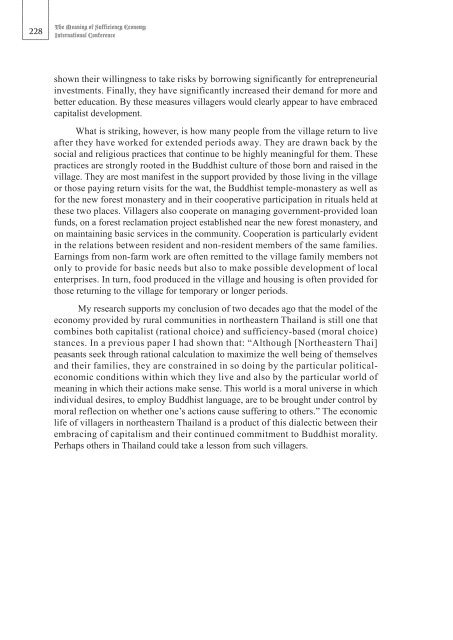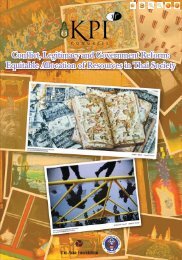SUFFiciENcy EcONOMy ANd GRASSROOtS DEvElOPMENt
SUFFiciENcy EcONOMy ANd GRASSROOtS DEvElOPMENt
SUFFiciENcy EcONOMy ANd GRASSROOtS DEvElOPMENt
You also want an ePaper? Increase the reach of your titles
YUMPU automatically turns print PDFs into web optimized ePapers that Google loves.
228<br />
The Meaning of Sufficiency Economy <br />
International Conference<br />
shown their willingness to take risks by borrowing significantly for entrepreneurial<br />
investments. Finally, they have significantly increased their demand for more and<br />
better education. By these measures villagers would clearly appear to have embraced<br />
capitalist development.<br />
What is striking, however, is how many people from the village return to live<br />
after they have worked for extended periods away. They are drawn back by the<br />
social and religious practices that continue to be highly meaningful for them. These<br />
practices are strongly rooted in the Buddhist culture of those born and raised in the<br />
village. They are most manifest in the support provided by those living in the village<br />
or those paying return visits for the wat, the Buddhist temple-monastery as well as<br />
for the new forest monastery and in their cooperative participation in rituals held at<br />
these two places. Villagers also cooperate on managing government-provided loan<br />
funds, on a forest reclamation project established near the new forest monastery, and<br />
on maintaining basic services in the community. Cooperation is particularly evident<br />
in the relations between resident and non-resident members of the same families.<br />
Earnings from non-farm work are often remitted to the village family members not<br />
only to provide for basic needs but also to make possible development of local<br />
enterprises. In turn, food produced in the village and housing is often provided for<br />
those returning to the village for temporary or longer periods. <br />
My research supports my conclusion of two decades ago that the model of the<br />
economy provided by rural communities in northeastern Thailand is still one that<br />
combines both capitalist (rational choice) and sufficiency-based (moral choice)<br />
stances. In a previous paper I had shown that: “Although [Northeastern Thai]<br />
peasants seek through rational calculation to maximize the well being of themselves<br />
and their families, they are constrained in so doing by the particular politicaleconomic<br />
conditions within which they live and also by the particular world of<br />
meaning in which their actions make sense. This world is a moral universe in which<br />
individual desires, to employ Buddhist language, are to be brought under control by<br />
moral reflection on whether one’s actions cause suffering to others.” The economic<br />
life of villagers in northeastern Thailand is a product of this dialectic between their<br />
embracing of capitalism and their continued commitment to Buddhist morality.<br />
Perhaps others in Thailand could take a lesson from such villagers.














